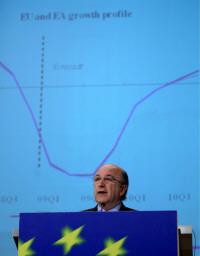The European Commission has revised its economic forecast for Italy and now expects GDP this year to fall by 4.4% to then inch up by only 0.1% in 2010.
In January, the European Union executive had predicted that GDP would decline by 2% in 2009 and rise by 0.3% next year.
The latest forecast from the Italian government saw GDP sinking 4.2% this year and climbing 0.3% in 2010.
The EC's latest GDP forecast for 2009 was the same as what the International Montetary Fund (IMF) predicted last month, although the IMF said next year would see GDP increase by 0.4%.
In a report out on Monday, the EC said GDP prospects for Italy this year suffered from a major slump at the end of 2008.
Nevertheless, the EC observed that the situation appears to be leveling out with some indicators back on the rise.
Among these was consumer confidence with more Italians ready to take advantage of government incentives to scrap old cars in order to benefit from discounts for new, more green vehicles.
According to the European commissioner for economic affairs, Joaquin Almunia, The EU economy ''is no longer in a free fall but we are still not out of the crisis because we are still in the middle of a very serious and deep recession''.
In its report on Italy, the EC said that the budget deficit would climb from 2.7% of GDP last year to 4.5% in 2009 and 4.8% next year.
The EC has previous predicted that the deficit would be 3.8% this year and 3.7% in 2010.
Italy's public debt, the third-biggest in the world after the United States and Japan, respectively, is now expected to jump from 105.8% of GDP last year to 113% in 2009 and then 116.1% next year, its highest since the end of the 1990s.
The debt, the EC observed, ''could climb by another percentage point depending on how much banks seek for recapitalization,'' through the so-called Tremonti bonds.
GDP for the 16-nation euro zone and EU as a whole is now expected to fall by 4% in 2009 to then diminish a further 0.1% next year.
GDP in the euro zone was brought down by a 9% plunge this year in Ireland together with the drops of 5.4% in Germany and 4.7% in Finland, along with the 4.4% decline in Italy.









